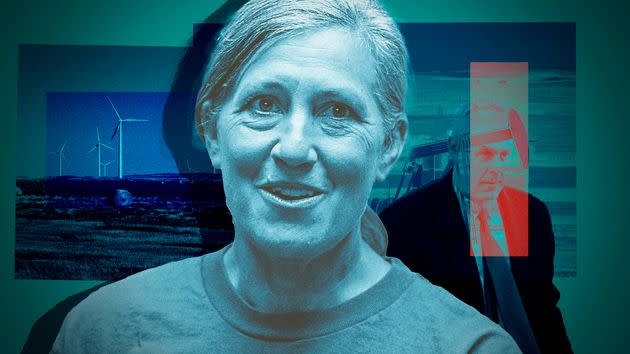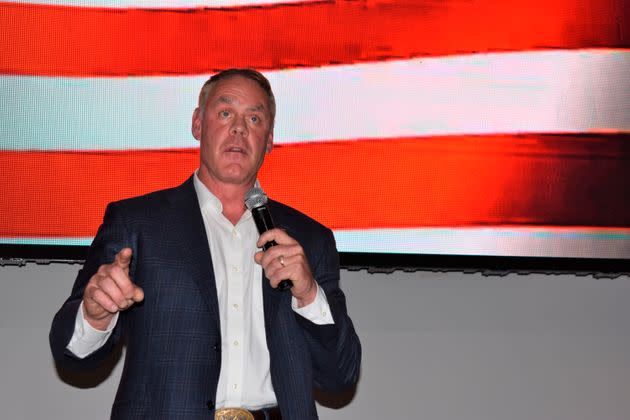A Scrappy Environmental Attorney Is Looking To Keep Ryan Zinke From Returning To DC
- Oops!Something went wrong.Please try again later.
- Oops!Something went wrong.Please try again later.
- Oops!Something went wrong.Please try again later.

Democrat Monica Tranel, an environmental lawyer and two-time Olympic rower, is running for a U.S. House seat against Donald Trump's former interior secretary, Ryan Zinke. (Photo: Illustration: Damon Dahlen/HuffPost; Photos: Getty)
Ryan Zinke, the former Montana congressman and Trump-era interior secretary, says he “hates” Washington, D.C., and the so-called “swamp” of bureaucratic insiders.
Democrat Monica Tranel wants to do him a favor and keep him from returning to Congress and the nation’s capital next year.
Tranel, an environmental lawyer and two-time Olympic rower, has run a scrappy campaign for Montana’s new U.S. House seat, slamming her Republican opponent as the face of Trump-era corruption and running numerous advertisements comparing him to a snake. Above all, Tranel, who once ran for state office as a Republican, is pitching herself as someone who would go to bat for residents of the Treasure State instead of the sort of special interests that she says Zinke has “sold out” to.
“I’ve asked voters to vote for me the way people voted in Montana when I was growing up. We vote for people, not parties,” she told HuffPost. “I will serve Montana because this is my home and this is who I am. It’s what I’ve spent my life doing. It’s what I know.”
The race pits an environmental attorney who has battled the state’s largest utility on behalf of renewable energy firms and climate advocates against Montana’s former at-large U.S. representative and the muscle of the Trump administration’s fossil fuel-centric “energy dominance” agenda.
The new House district covers the western part of the state and was created last year to account for population growth in Big Sky Country. It is the first time Montana has had two House seats since 1993.
Early on, Zinke was widely expected to be a shoo-in for the seat, given his credentials in a state that President Donald Trump carried by 16 points in 2020. But he floundered in the June primary, barely edging out a win over Al Olszewski, a former state senator and hard-line conservative who attacked Zinke as a self-serving liberal who “quit” Trump.
Limited polling indicates that Tranel has gained ground down the stretch. One poll of some 800 likely voters early this month, commissioned by a Democratic political action committee, identified the race as a virtual toss-up, with Zinke at 41% and Tranel at 40% support.
The third candidate, Libertarian John Lamb, is also polling high for a third-party candidate and threatens to peel conservative votes away from Zinke. Politico reported earlier this month that Zinke asked Lamb to drop out of the race and endorse him. More recently, Zinke has accused Tranel and Lamb of working together to defeat him.
The increasingly competitive landscape has caused several of the nation’s top political analysts, including the Cook Political Report and Larry Sabato, to shift their forecasts for the race from “likely Republican” to “leans Republican.”
Tranel rejects the idea that this district was ever out of reach for Democrats, pointing to the fact that Sen. Jon Tester (D) won it by 10 points in 2018 and Sen. Steve Daines (R) carried it by only 1 point in 2020.
“The polling that we’ve had has shown it’s even, and honestly, I’m surprised that it’s even,” Tranel said. “I don’t think Ryan Zinke should have a chance in this race. I can’t believe anybody would vote for him after the ways that he has betrayed us and sold himself to whatever industry will pay him some money. It’s not what Montana needs.”
Zinke’s campaign did not respond to HuffPost’s request for comment.

Monica Tranel campaigns for Montana's newly created U.S. House seat on Sept. 17, 2022, in Bozeman, Montana. (Photo: William Campbell via Getty Images)
‘Investments In Our Future’
As in other midterm races across the country, energy and the economy have been hot-button issues. Zinke, who made a small fortune consulting for ConocoPhillips and other oil and gas interests after resigning from his Interior Department post in early 2019, is campaigning on a promise to restore so-called “American energy independence” and bring back $2 per gallon gasoline — a seemingly impossible task for a lone member of the House.
Meanwhile, Tranel is appealing to voters as someone well-positioned to help lead Montana and the nation in its transition away from planet-warming fossil fuels.
“I have done renewable energy projects from soup to nuts,” she said. “I’ve represented the landowner, I’ve represented the project developer. I’ve represented the project operator and owner. The consumer. I’ve written the contracts, I’ve written the power purchase agreements. I understand how they work, I understand where their money is, I understand how these things are deployed on the ground.”
Tranel said the Inflation Reduction Act, the landmark package that Congress passed in August and that includes a historic $369 billion in climate and clean energy investments, presents an enormous opportunity for Big Sky Country.
“The money and the energy transition lies in the future; it lies in renewable resources,” she said. “And smart people are sinking their money in their investments in our future.”
“We have incredible resources,” she said of Montana. “We have winter-peaking wind. We have solar. We have hydro. I think it’s a question of having a person be a bridge between the resources that are available and resources that are on the ground and connecting those up. I can be that person for Montana in a very unique way.”
I don’t think Ryan Zinke should have a chance in this race. I can’t believe anybody would vote for him after the ways that he has betrayed us and sold himself to whatever industry will pay him some money.Monica Tranel
Tranel points to her 25-year legal career in Montana, which included working as a staff attorney for Montana’s Public Service Commission, a state agency that regulates utility companies, and later at the Montana Consumer Counsel, which represents consumer interests in utility matters before the PSC. Tranel twice ran unsuccessfully for a seat on the PSC, first as a Republican in 2004 and as a Democrat in 2020.
Since launching her own private practice in 2016, Tranel has represented renewable energy clients and climate advocates in matters before both the PSC and Montana courts. In one of her higher-profile cases, she represented climate group 350 Montana in successfully challenging a 2003 state law that exclusively gave NorthWestern Energy, the largest power company in the state, the ability to seek pre-approval from the PSC to up its rates to cover costs associated with future projects and acquisitions. A judge struck the law down as unconstitutional earlier this year, ruling that it granted “an exclusive and lucrative financial benefit only on NorthWestern.”
Tranel says that legal challenge saved Montana ratepayers $10 million. Zinke, meanwhile, has sought to pin the blame for high energy costs on Democratic policies and, more specifically, Tranel’s lawsuit against Northwestern.
A recent Washington Post analysis showed public support for President Joe Biden and Democratic House candidates moving in tandem with gas prices. As gas prices went up, approval dropped, and vice-versa.
Asked if Democrats have a messaging problem when it comes to the issue of high gas and energy prices, which are driven by a complex set of factors, Tranel took a swing at her opponent.
“I reject the idea that Ryan Zinke knows anything about energy. He doesn’t,” she said. “He has taken a lot of money from fossil fuel corporations. That doesn’t mean he knows anything about energy.”
Tranel pointed out that Zinke backed Republican-led legislation in 2015 that lifted the 40-year ban on crude oil exports — a move that has led to a surge in U.S. oil and natural gas exports but contributed to higherprices for domestic consumers.
“The fact that our gas prices are high is a function of the Republican decision to open up our market and compete internationally,” she said. “What I say is, ‘Every time you put gas in your [car], think how much of that is going into Ryan Zinke’s pocket.’ That’s what we’re paying for. We’re paying for political pawns like him to do the bidding of the fossil fuel corporations.”

Former Trump administration Interior Secretary Ryan Zinke speaks on May 13, 2022, in Butte, Montana. (Photo: AP Photo/Matthew Brown, File)
Taking On Serpents
Zinke’s scandal-plagued record at the Interior Department has also been front and center in the race.
The former Navy SEAL faced a dizzying 18 federal probes into his conduct and policy decisions. Zinke has done his best to downplay the probes, simultaneously dismissing them as “political hit jobs” while falsely claiming that he was ultimately cleared of any wrongdoing. And at a recent debate, he slammed Interior Inspector General Mark Greenblatt — whom Trump nominated to the post — as a “political hack,” although he didn’t mention Greenblatt by name.
At least four separate investigations into Zinke’s actions as interior secretary found varying levels of misconduct, including that he misused his office and lied to investigators.
Asked about Zinke’s various broadsides against the Interior Department’s Office of Inspector General, a spokesperson for the office, Erica Paulson, replied, “Our work demonstrates our long track record of conducting fair, objective, and unbiased oversight. This is a fundamental part of Inspector General independence and is consistent with the governing standards followed by the entire OIG community.”
If Zinke loses his reelection bid on Nov. 8, it will be in no small part because those scandals followed him home.
Tranel has spent a lot of time and resources making sure they do, drawing attention to Zinke’s ethical shortfalls during debates and in TV advertisements and handing out copies of Interior Department watchdog reports into his conduct. This week, she released what is at least her fourth snake-themed ad. “We gave Ryan Zinke a chance. He sold us out to line his own pockets,” she says. “After I deal with Ryan Zinke, I’m coming for the rest of the snakes ripping us off.”
In announcing that it had changed its rating for Zinke and Tranel’s race earlier this month, The Cook Political Report wrote that the contest should have been a “slam dunk” for Republicans, but that Zinke’s “ethics-clouded exit from the Trump administration and whereabouts since have complicated his congressional comeback bid.”
In its own announcement, Sabato’s Crystal Ball wrote that Zinke was “plagued by a number of ethics investigations” and “lost some luster” after becoming a national figure in the Trump administration.
Tranel and Zinke are both promising to go to war with serpents if elected as Montana’s next House representative. They just have very different views about who it is that makes up that proverbial swamp.
To Zinke, the snakes are Biden, House Speaker Nancy Pelosi and anyone who would support their agendas, as well as so-called “radical environmentalists” and “deep state” bureaucrats. If re-elected to Congress, Zinke has promised that his first piece of legislation would be what he’s dubbed the Federal Employee Accountability & Reduction Act, or FEAR Act, a 10-point legislative framework to gut federal agencies of public servants and limit how long a person can hold a federal job.
To Tranel, the snakes are special interests and people like her opponent.
“There’s nothing fake about showing up and answering questions from the people of Montana,” she said, a dig at Zinke’s decision to skip more than a dozen candidate forums ahead of the midterm, including one in his hometown of Whitefish. “He thinks he’s entitled to win and that people in Montana are just going to vote for him because he has an R behind his name. I have more respect for the people of Montana than that.”
If elected, Tranel says she’d prioritize legislation to address Montana’s housing crisis, conserve public lands, protect abortion access and strengthen rights for union workers. And while she’d enter Congress at a time of deep political division and, if forecasts prove accurate, part of a Democratic minority, Tranel has every intention of making her mark. She draws inspiration from Jeannette Rankin, the famous women’s rights activist from Montana who in 1917 became the first female member of Congress and championed legislation that eventually became the 19th Amendment, granting women the right to vote nationwide.
“I say never underestimate the power of a freshman congresswoman from Montana,” Tranel said.
CORRECTION: A previous version of this article misstated when the Montana primary was held and when Ryan Zinke resigned from Interior.
This article originally appeared on HuffPost and has been updated.
